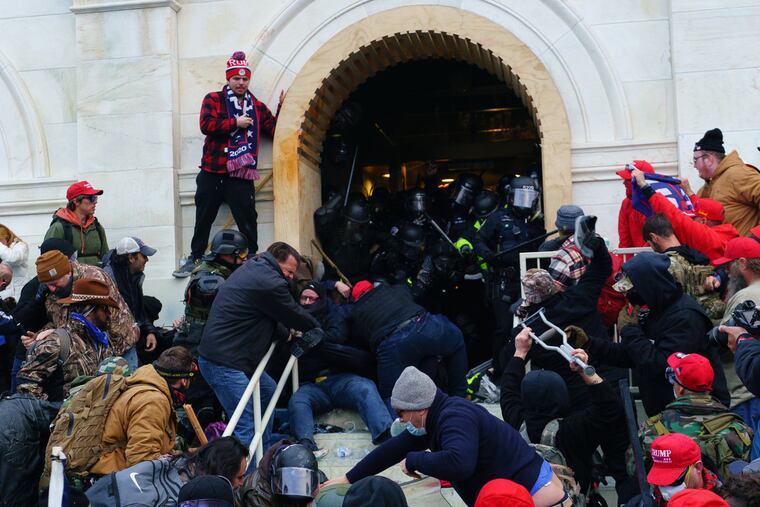Man tied to Jan. 6 attack on Capitol Police officer who later died pleads guilty to lesser charges
George Pierre Tanios of West Virginia pleaded guilty to two misdemeanors. A Pennsylvania man also charged in the assault, Julian Elie Khater, is scheduled for a trial later this year.

A West Virginia man initially charged with assaulting a police officer who died after defending the U.S. Capitol from a mob pleaded guilty on Wednesday to misdemeanor offenses that could allow him to avoid more jail time. Another man accused of attacking the officer with bear spray is weighing a stricter plea deal that calls for a prison sentence exceeding six years.
A federal grand jury indicted George Pierre Tanios last year on felony charges that he conspired with a Pennsylvania man, Julian Elie Khater, to assault and injure Capitol Police Officer Brian Sicknick with chemical spray during the riot on Jan. 6, 2021.
Tanios, 40, pleaded guilty to two misdemeanors, each of which carries a maximum sentence of one year of imprisonment.
Tanios’ attorney, Elizabeth Gross, said in an emailed statement that the parties “worked diligently toward a fair and just resolution short of trial” and that the misdemeanors “better reflect the limited actions” of Tanios on Jan. 6.
Prosecutors also have extended an offer for Khater to plead guilty to felony assault charges. If he accepts the offer, estimated sentencing guidelines will recommend a prison term ranging from six years and six months to eight years and one month. Khater hasn’t decided whether to accept that plea offer, one of his lawyers said Wednesday during a virtual hearing.
The medical examiner’s office in Washington, D.C., determined in April 2021 that Sicknick, 42, suffered a stroke and died from natural causes.
U.S. District Judge Thomas Hogan is scheduled to sentence Tanios on Dec. 6. Hogan said the estimated sentencing guidelines for Tanios range from no jail time to six months of imprisonment for both counts. Tanios was jailed for about five months after his arrest and could get credit for time served.
Khater has remained jailed while awaiting a trial in October on felony charges, including assaulting a federal officer with a dangerous weapon. Prosecutors’ offer to Khater would require him to plead guilty to that charge. The offer expires on Aug. 17.
Tanios, of Morgantown, West Virginia, and Khater, of State College, Pennsylvania, weren’t charged in Sicknick’s death. But the case against them has been among the most prominent brought by the Justice Department, which is prosecuting hundreds of people for their conduct at the Capitol on Jan. 6.
Sicknick and other officers were standing guard behind metal bicycle racks as the mob of pro-Trump supporters stormed the Capitol. Prosecutors have said Khater sprayed Sicknick and other officers with bear spray after retrieving a canister from Tanios’ backpack.
Tanios’ attorneys have said he brought the chemical spray to Washington for self-defense at the “Stop the Steal” rally on Jan. 6. In a court filing last year, they said there was no evidence that Tanios and Khater planned to use the spray in “an ultra-coordinated attack” on police.
“Indeed, had Mr. Tanios been a violent member of a mob and a willing participant in a riot, he would have been running around spraying people himself. He never did because that was not the reason for his travel to Washington, D.C.,” they wrote.
Tanios pleaded guilty to two counts: entering and remaining in a restricted building or grounds and disorderly and disruptive conduct in a restricted building or grounds. Both are misdemeanors punishable by a maximum sentence of one year of imprisonment and a fine of up to $100,000.
Tanios isn’t accused of entering the Capitol on Jan. 6.
A trial for Khater is scheduled to start on Oct. 5.
Hogan had refused to free Tanios and Khater from jail before trial, calling them dangerous. The judge said Tanios “coordinated the direct assault” on Sicknick and two other officers.
“Mr. Khater did the spraying. Mr. Tanios did not, but he obviously worked with him on that despite (defense) counsel’s arguments,” Hogan said during a May 2021 hearing, according to a transcript.
But a federal appeals court ruled in August 2021 that Tanios could be released from pretrial detention. A three-judge panel concluded that Hogan erred in assessing the danger posed by Tanios, who didn’t have any felony convictions or ties to any extremist organizations.
Tanios operated a sandwich restaurant in Morgantown near West Virginia University’s campus. Khater told investigators that he drove from New Jersey to pick up Tanios in West Virginia before they traveled to Washington on the eve of the riot.
In a court filing last year, prosecutors said Tanios and Khater “carefully timed their assault on the officers to occur in tandem with an attack on the police barrier.”
“This allowed the defendants to assault the officers while they were distracted, maximizing their chances of landing chemical spray in their eyes and thus incapacitating them to the point where the police line would break,” they wrote.
More than 100 police officers were injured at the Capitol.
The medical examiner’s office concluded that a medical condition alone — not an injury — caused Sicknick’s death. U.S. Capitol Police said the medical examiner’s findings didn’t change the fact that Sicknick had died in the line of duty, “courageously defending Congress and the Capitol.”
“The attack on our officers, including Brian, was an attack on our democracy,” police officials said in a statement last year.
More than 840 people have been charged with federal crimes related to Jan. 6. Over 340 have pleaded guilty, mostly to misdemeanors, and over 200 have been sentenced. More than 260 people are charged with assaulting or impeding law enforcement during the riot, according to the Justice Department.
The longest prison sentence for a Capitol rioter so far is five years and three months.